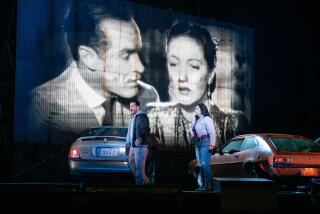Graves has operatic moments
- Share via
When Los Angeles last saw mezzo-soprano Denyce Graves in June, she was camping it up as the Dragon in Los Angeles Opera’s “Grendel.” That is presumably about as far as you can get from the formal, austere, nowhere-to-hide setting of a song recital, the format in which Graves was heard at UCLA’s Royce Hall on Thursday night. There were gratifications in this -- no smoke, no distracting production, better music.
With her longtime pianist, Warren Jones, in support, Graves started with some early English music -- the suddenly fashionable (thanks to Sting) John Dowland’s “Come Again: Sweet Love Doth Now Invite” and Purcell’s “Music for a While” -- her voice sounding a bit bright and slightly metallic, except for the hefty chest tones. She raced through the stirring “Iris, Hence Away” from Handel’s “Semele” with somewhat wild vibrato in the upper register.
In four Schubert lieder, the rich warmth in timbre for which Graves is known began to surface as she brought her operatic temperament and projection to “Death and the Maiden” and “Gretchen at Her Spinning Wheel.” Now thoroughly in gear, she and Jones scrapped the announced aria from Donizetti’s “La Favorita” in favor of the crowd-pleasing Seguidilla from one of her signature roles, “Carmen” -- featuring a deliciously contemptuous, in-character laugh. A tempestuous “Acerba Volutta” from Cilea’s “Adriana Lecouvreur” -- with Graves hitting the phrase “l’eternita nell’attimo misura” like a hammer -- closed the first half.
Graves brought overpowering passion, almost beyond control, to a selection from Falla’s “La Vida Breve” before settling down with the Seguidilla and Jota from the composer’s Seven Spanish Folksongs. Next came some music from the Ohio-based composer (his day job is with a piano manufacturer) Robert Saari, who displayed a winning, plain-spoken melodic gift in his song cycle “When the Forsythia Bloom.” Perhaps the order of the last two songs could have been reversed so that the words would chronologically depict events before, during and after a love affair, but musically, the lineup made sense.
Another program insert was a trio of songs by the once-popular African American composer Harry Burleigh (1866-1949), which turned out to be a string of rather uninteresting, melodramatic salon pieces.
Since Burleigh was best known in his time for his arrangements of spirituals, that led logically to the program’s finale, a selection of four spirituals in which Graves (and Jones too) alternated between dignified formality and letting their hair down in fun.
There were three encores: more “Carmen” (the Habanera), another spiritual and a song about the joys of canine ownership.
More to Read
The biggest entertainment stories
Get our big stories about Hollywood, film, television, music, arts, culture and more right in your inbox as soon as they publish.
You may occasionally receive promotional content from the Los Angeles Times.








